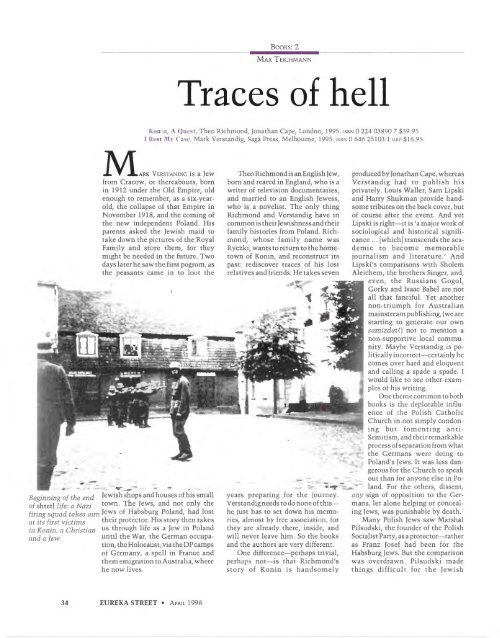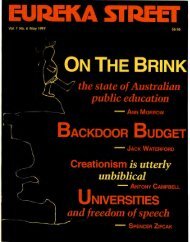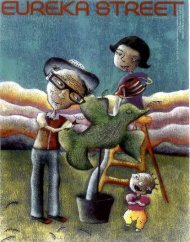Shane Malone - Eureka Street
Shane Malone - Eureka Street
Shane Malone - Eureka Street
Create successful ePaper yourself
Turn your PDF publications into a flip-book with our unique Google optimized e-Paper software.
BOOKS: 2<br />
MAX TEICHMANN<br />
Traces of hell<br />
Konin, A Quest, Thea Richmond, Jonathan Cape, London, 1995. ISBN 0 224 03890 7 $39.95<br />
1 Rest My Case, Mark Verstandig, Saga Press, Melbourne, 1995. ISBN 0 646 25 103 1 RRI' $1 n.95<br />
M A" V"m•mc '' • jew<br />
from Cracow, or thereabouts, born<br />
in 1912 under the Old Empire, old<br />
enough to remember, as a six-yearold,<br />
the collapse of that Empire in<br />
November 1918, and the coming of<br />
the new independent Poland. His<br />
parents asked the Jewish maid to<br />
take down the pictures of the Royal<br />
Family and store them, for they<br />
might be needed in the future. Two<br />
days later he saw the first pogrom, as<br />
the peasants came in to loot the<br />
Beginning of the end Jewish shops and houses of his small<br />
of shtetllife: a Nazi town. The Jews, and not only the<br />
firing squad Lakes aim Jews of Habsburg Poland, had lost<br />
at iLs first victims then protector. H1s story then takes<br />
in Konin, a Christian us through life as a Jew in Poland<br />
and a few.<br />
until the War, the German occupation,<br />
the Holocaust; via the DP camps<br />
of Germany, a spell in France and<br />
them emigration to Australia, where<br />
he now lives.<br />
Thea Richmond is an English Jew,<br />
born and reared in England, who is a<br />
writer of television documentaries,<br />
and married to an English Jewess,<br />
who is a novelist. The only thing<br />
Richmond and Verstandig have in<br />
common is their Jewishness and their<br />
family histories from Poland. Richmond,<br />
who e family name was<br />
Ryczki, wants to return to the hometown<br />
of Konin, and reconstruct its<br />
past: rediscover traces of his lost<br />
relatives and friends. He takes seven<br />
years preparing for the journey.<br />
Verstandig needs to do none of thishe<br />
just has to set down his memories,<br />
almost by free association, for<br />
they are already there, inside, and<br />
will never leave him. So the books<br />
and the authors are very different.<br />
One difference- perhaps trivial,<br />
perhaps not-is that Richmond's<br />
story of Konin is handsomely<br />
produced by Jonathan Cape, whereas<br />
Verstandig had to publish his<br />
privately. Louis Waller, Sam Lipski<br />
and Harry Shukman provide handsome<br />
tributes on the back cover, but<br />
of course after the event. And yet<br />
Lipski is right-it is 'a major work of<br />
sociological and historical sign ificance<br />
... [which] transcends the academic<br />
to become memorable<br />
journalism and literature.' And<br />
Lipski's comparisons with Sholem<br />
Aleichem, the brothers Singer, and,<br />
even, the Russians Gogo!,<br />
Gorky and Isaac Babel are not<br />
all that fanciful. Yet another<br />
non-triumph for Australian<br />
mainstream publishing, (we are<br />
starting to generate our own<br />
samizdat) not to mention a<br />
non-supportive local community.<br />
Maybe Verstandig is politically<br />
incorrect-certainly he<br />
comes over hard and eloquent<br />
and calling a spade a spade. I<br />
would like to see other examples<br />
of his writing.<br />
One theme common to both<br />
books is the deplorable influence<br />
of the Polish Catholic<br />
Church in not simply condoning<br />
but fomenting anti<br />
Semitism, and their remarkable<br />
process of separation from what<br />
the Germans were doing to<br />
Poland's Jews. It was less dangerous<br />
for the Church to speak<br />
out than for anyone else in Poland.<br />
For the others, dissent,<br />
any sign of opposition to the Germans,<br />
let alone helping or concealing<br />
Jews, was punishable by death.<br />
Many Polish Jews saw Marshal<br />
Pilsudski, the founder of the Polish<br />
Socialist Party, as a protector-rather<br />
as Franz Josef had been for the<br />
Habsburg Jews. But the comparison<br />
was overdrawn. Pilsudski made<br />
things difficult for the Jewish<br />
34 EUREKA STREET • APRIL 1996
















